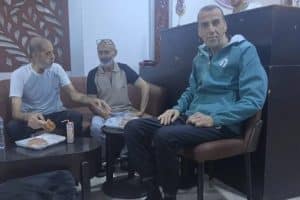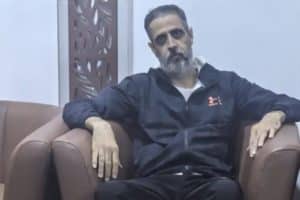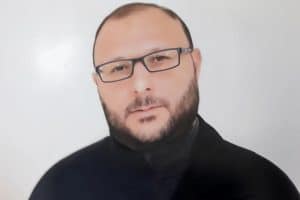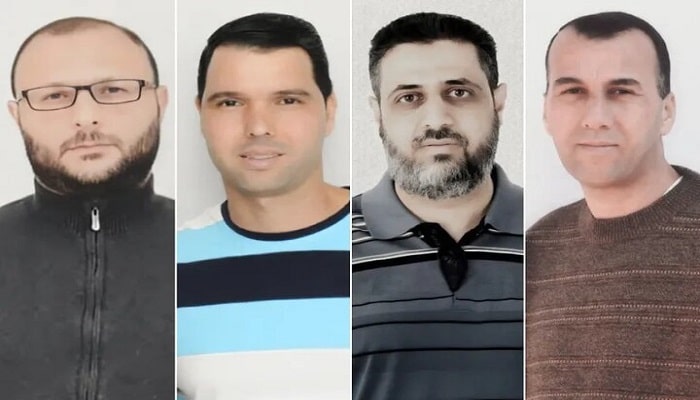PNN – Among the freed Palestinian prisoners sentenced to life imprisonment, there are four who have a special bond with each other. They are Samir Abu Nima, Mahmoud Issa, Baher Badr, and Muhammad Abu Tabikh.
According to the report of Pakistan News Network, citing Al Jazeera, among the freed Palestinian prisoners sentenced to life imprisonment, there are four people who have a special bond with each other. They are Samir Abu Nima, Mahmoud Issa, Baher Badr and Muhammad Abu Tabikh. These four people, who were exiled to Egypt after their release, each have a unique story of their unique lives.
Samir Abu Neema; the oldest prisoner of Jerusalem
When Samir Abu Nima was arrested in 1986, he was a 26-year-old young man with a bachelor’s degree in hotel management. He joined the Fatah movement and became a member of its military core, which planned and carried out the bombing of a Zionist bus in Jaffa as part of a series of martyrdom operations against the Zionist military.
After severe interrogations and torture, he was sentenced to life imprisonment in Al-Maskubiya Prison in Jerusalem. During his captivity, Samir moved between the occupying forces’ prisons, carried out various strikes, and participated in managing the activities of the prisoners’ movement.

Abu Nima suffered from numerous illnesses and underwent six surgeries in prison. His name was even on the list of prisoners exchanged between the Palestine Liberation Organization and the Zionist regime in 1993, but the Zionists opposed his release.
Samir lost his mother and three brothers while in detention, without being allowed to visit or say goodbye to them. His brother Walid died in 2016 on the night he was preparing to meet him, and his mother waited for him until her death. Samir Abu Nima finally tasted freedom after 39 years in captivity.
Mahmoud Issa; Commander of the Special Unit
Mahmoud Musa Issa, a Palestinian freedom fighter, was a unique example of a militant intellectual and one of the most prominent intellectual and organizational experiences in the prisoners’ movement. He was born on May 21, 1968, in the city of Anata in the Jerusalem area. He was one of the first young people to join the Qassam Brigades (the military wing of Hamas) immediately after its establishment, and he established “Special Unit 101” within these forces. This was the first unit in Jerusalem that was tasked with capturing Zionist soldiers for exchange with Palestinian prisoners.
On December 13, 1992, this unit carried out an operation to capture the Zionist soldier Nasim Toledano near the town of Lad and held him in a cave near the village of Hazma. The purpose of this operation, which was carried out under the name “Loyalty to Sheikh Ahmed Yassin,” the founder and leader of the Islamic Resistance Movement (Hamas), was to exchange him for Sheikh Ahmed Yassin, who was being held captive by the Zionist regime at the time. Despite the failure of the exchange operation and the discovery of the body of the slain soldier, the incident caused an earthquake in Zionist circles.

Nevertheless, Issa and his comrades continued their operations. In March 1993, they overpowered another Zionist soldier, Noam Koller, in Al-Khudaira, and in the same month, they killed two Israeli policemen in another operation and shot and seriously wounded an Israeli officer with the rank of colonel in the city of Ramallah.
Issa was arrested on June 3, 1993, after months of pursuit, and was subjected to torture and severe interrogation for two months in the centers of Jerusalem and Ramallah, until the occupiers sentenced him to three life sentences and 46 years in prison. He spent 13 years of this period in solitary confinement, during which time he was also deprived of visits from his family.
Mahmoud Issa became a writer and thinker during his captivity, authoring numerous works on political jurisprudence as well as literary and intellectual criticism and analysis.
Baher Badr; Captivity on the eve of the wedding ceremony
In July 2004, the Badr family was preparing for their son Baher’s wedding. But Baher was kidnapped from his brother’s home in the city of Ramallah a few days before his wedding, to spend 21 painful years in Israeli prisons. After 4 months of intense and focused torture and interrogation, the Israeli court sentenced him to 12 life sentences on charges of membership in the Qassam Brigades and assisting in martyrdom operations.

Baher was not alone in this fate; his brother Bahij Badr was also arrested that same night and sentenced to 18 life sentences. Even their mother was not spared from the clutches of the occupier; she was also arrested a few weeks later and, despite her chronic illness and advanced age, was imprisoned in solitary confinement.
Muhammad Abu Tabikh, a fighter in the jihadist and scientific arenas
He was first captured by the Zionists in 1999 after his first year of university, but was soon released and quickly returned to the fight against the occupation. After his release, he joined the ranks of the resistance, especially the Quds Brigades (the military wing of the Islamic Jihad movement).
The occupying forces arrested Abu Tabikh again on July 28, 2002, after he participated in preparing homemade bombs and helping in the battle for the Jenin camp, and sentenced him to two life sentences and 15 years in prison.

The Israeli regime’s imprisonment did not prevent his success in other areas. During his 22 years in prison, he earned three bachelor’s degrees and wrote a two-volume book titled “The Path of the Truthful,” in which he documented the stories of 42 Palestinian prisoners.

